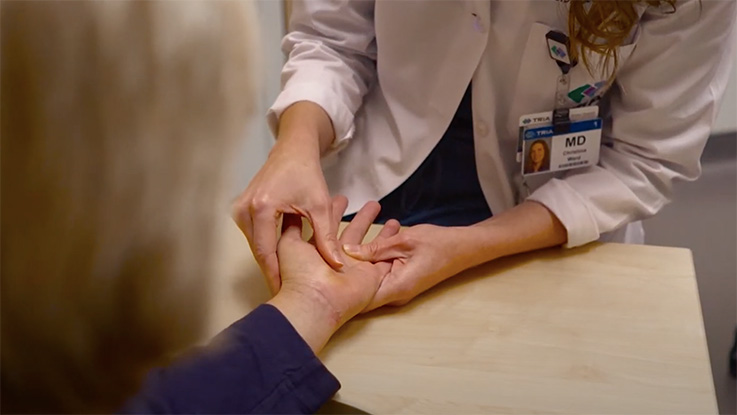Hand surgery
Hand surgeries for all types of conditions
While most hand and arm conditions can be treated without surgery, surgery is sometimes the best treatment to help you feel like yourself again. Our orthopedic hand surgeons have extensive training to work with patients who are trying to relieve pain, improve function, or manage chronic hand and arm conditions. We’ll guide you to the hand surgery that will work best for you and make sure you know what to expect at every step.
At TRIA, we perform many of our hand surgeries as outpatient procedures in our specially designed hand procedure rooms, including carpal tunnel release and trigger finger release surgeries. Here, you’ll get the same exceptional care while saving time and money. Our team of orthopedic hand surgeons can help you with everything from a broken bone to carpal tunnel syndrome.

Many common hand surgeries are outpatient procedures
We’re one of the only hand care programs in the Twin Cities that performs many of our surgeries in one of our hand procedure rooms. There are many benefits to having hand surgery done in the clinic:
- Surgery performed in our hand procedure rooms spend 75-90 minutes in the clinic compared to over four hours for procedures done under general anesthesia in the operating room.
- You won’t be put under general anesthesia, which shortens your recovery time. We’ll use local anesthetic to keep you comfortable during your procedure.
- Having surgery in the clinic gives you the same high-quality surgical care at a more affordable cost to you.
- Staying awake during your hand procedure is often more convenient for you. You’re able to eat before the procedure and drive yourself home afterwards.
Conditions we treat with hand surgery
Surgery can be used to treat a wide range of hand and wrist conditions, including:
Arthritis Carpal tunnel syndrome - Cubital tunnel syndrome
Fractures (broken bones)
- Ganglion cysts
Sprains and strains Tendonitis and tendon injuries Trigger finger
We’ll work with you to determine if hand surgery is the best treatment option for you. If it is, we’ll let you know how to prepare and answer all your questions about the procedure.

Types of hand surgeries we perform
Our orthopedic hand surgeons are experts in a comprehensive range of hand surgeries. We’ll guide you to the procedure that will work best for your condition and ensure that you feel prepared and comfortable on the day of your surgery.
Types of hand surgeries we commonly perform include:
Carpal tunnel release surgery
The carpal tunnel is a passageway created by the bones in your wrist and the transverse carpal ligament. The tendons and median nerve that connect to your fingers pass through this passageway. Injury or overuse can cause the tissues in the carpal tunnel to swell and put pressure on the median nerve, causing pain, tingling or numbness. During carpal tunnel release surgery, our hand surgeons will cut through the ligament that runs across the carpal tunnel to relieve pressure on the nerve. This procedure reduces pain and improves function.
Trigger finger release surgery
Trigger finger is caused when the tendon that allows your finger to bend and move becomes swollen or irritated. This condition often impacts people who overwork their fingers with repetitive motions like frequently squeezing things or lifting heavy objects. During trigger finger release surgery, our hand surgeons will make a small incision in the tendon, enabling it to move more easily.
Ganglion cyst removal
A ganglion cyst, sometimes called a bible cyst, is a lump that grows near the tendons or joints on the hands. While this type of cyst isn’t harmful, it can cause pain or discomfort. Ganglion cysts may heal on their own, but surgery is sometimes needed in order to fully remove the uncomfortable lumps. During ganglion cyst removal, our hand surgeons will take out the stalk of the cyst so your hand can heal.
Fracture fixation
If you break a bone in your hand or wrist, the hand surgeons at TRIA are here to help make sure it heals properly. During fracture fixation surgery, we’ll stabilize your bones by shifting them back into place. We may use a cast or a splint to support your bones while you heal.
Tendon repair
Our tendons connect muscle to bones. Tendon damage can cause pain, stiffness and difficulty moving. Tendon repair surgery may be used to repair the tendon and improve function in your hand, wrist or arm. Depending on your condition, we may perform primary tendon repair surgery (done within 24 hours of the injury) or secondary tendon repair (surgery performed several weeks after the injury).
Joint replacement
Arthritis and other conditions can damage the joints in your arm, causing pain and making it difficult for you to move. If your condition doesn’t improve with physical therapy or other nonsurgical treatments, we might recommend joint replacement surgery. Also called arthroplasty, joint replacement surgery is a procedure where some or all of the damaged joint is replaced by an artificial joint.
